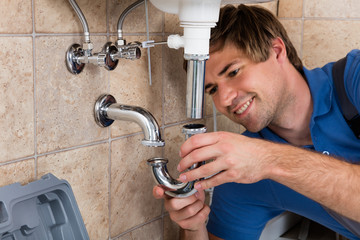Having a plumber is important to your home’s water supply. They are experts in maintaining sewage systems and installing potable water and drainage systems. Plumber is also qualified to perform other services, such as installing and repairing water heaters and softeners.
 Unlike commercial plumbers, residential plumbers specialize in home plumbing. They work on sewage, water heaters, and plumbing fixtures. They also repair leaks and unclog drains. Residential plumbers typically work from 9 to 5, Monday to Friday, and on weekends. Some plumbers may be on call overnight. Residential plumbing is simpler to navigate than commercial plumbing. Commercial plumbing requires more heavy-duty equipment and fittings. Commercial buildings also have a wider variety of fixtures. For example, a skyscraper might have hundreds of toilets and an intricate water heating system.
Unlike commercial plumbers, residential plumbers specialize in home plumbing. They work on sewage, water heaters, and plumbing fixtures. They also repair leaks and unclog drains. Residential plumbers typically work from 9 to 5, Monday to Friday, and on weekends. Some plumbers may be on call overnight. Residential plumbing is simpler to navigate than commercial plumbing. Commercial plumbing requires more heavy-duty equipment and fittings. Commercial buildings also have a wider variety of fixtures. For example, a skyscraper might have hundreds of toilets and an intricate water heating system.
Commercial plumbers are also required to deal with more fittings and sinks. They may also have to install sprinkler systems, drinking fountains, and other utilities. This type of work may take longer than a residential plumbing job. The most important thing to remember when choosing a plumber is that they need to be licensed. In Texas, plumbers must have a license to operate a business and install plumbing systems in residential homes. The license ensures that the plumber has the proper training and experience.
The best plumbing service will ask the right questions and clearly explain what they are doing. They should also offer mini tutorials on routine maintenance. They might also charge a little extra for work outside business hours.
Having a professional plumber to help you with your plumbing is a good idea. They can give you an estimate of how much water you are using in your home. They can also tell you if you need a new well. Plumbers are trained in various plumbing systems, including water supply, sanitary plumbing, and drainage. Depending on the job, they can install or repair fixtures, pipes, and water tanks.
Sanitary plumbers install and repair pipes and piping systems in the bathrooms and toilets of homes. They also troubleshoot sanitary problems in commercial bathing areas. They can also install water softeners and boilers for showers. Some plumbers also specialize in fire suppression systems. Plumbing materials vary, but are generally made of steel, plastic, and metal. They are also recyclable. Copper pipes are mainly used in residential homes, but can be very difficult to install. Plumbers use special tools to cut them.
Water supply plumbers also install water tanks and water supply systems in homes and businesses. They can also unclog drains. They install pipes for the supply of water to kitchens, bathrooms, and laundry rooms. They can also install water heaters for showers. Some plumbers specialize in installing new pipes for homes that have been built from scratch. Plumbers are also trained to repair water systems in commercial buildings. They will install and maintain water tanks and pipes in large businesses. They will also deal with large amounts of waste.
Many veterans spent countless hours handling guns, ammunition, and other military paraphernalia during their military service. While these are not the most glamorous or glamorous tasks, they certainly put them to the test. Military training can be a catalyst for a lifelong work ethic. Former Department of Labor Secretary said hiring veterans put skills to good use. The military has a number of programs for training prospective and current members of its ranks. These include a plethora of apprenticeship programs. Aside from training in the trade, military plumbers also receive special training in various areas. Some may even learn a bit of the art of explosives.
Aside from the usual suspects, plumbers are also hired from underrepresented communities. Many have a knack for manual dexterity. A great plumber is also socially adept. In addition to following instructions given by their superiors, they should also be able to take a page from the military’s playbook when it comes to problem-solving. Aside from the requisite credentials, former military men are much more tolerant of others. This includes people of different cultures. For instance, one of the best plumbers I ever worked with was a Korean veteran. This is due in large part to his willingness to work with others, a trait that many veterans have.
